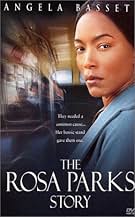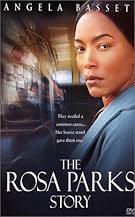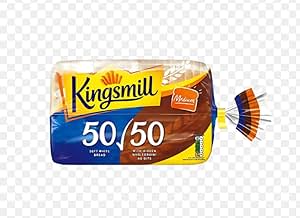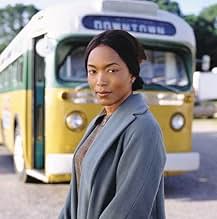VALUTAZIONE IMDb
7,2/10
1116
LA TUA VALUTAZIONE
Aggiungi una trama nella tua linguaA seamstress recalls events leading to her act of peaceful defiance that prompted the 1955 bus boycott in Montgomery, Alabama.A seamstress recalls events leading to her act of peaceful defiance that prompted the 1955 bus boycott in Montgomery, Alabama.A seamstress recalls events leading to her act of peaceful defiance that prompted the 1955 bus boycott in Montgomery, Alabama.
- Candidato a 1 Primetime Emmy
- 8 vittorie e 8 candidature totali
Dexter King
- Dr. Martin Luther King, Jr.
- (as Dexter Scott King)
Chardé Manzy
- Young Rosa
- (as Charde' Manzy)
Susan Savoie
- Virginia Foster Durr
- (as Susan Williams)
Recensioni in evidenza
The performance of Angela Bassett and the other actors in the movie was great. They portrayed the parts of the story that most people do not know. It brought out so many emotions, I could hardly control them. Like Rosa, I'd refuse to leave my seat, [or rather my sofa], as well.
I didn't plan to write a comment at first, but when I saw one big mistake the director did, I was compelled to write one as soon as I finished watching. I am surprised that no one at that time said anything to the director. It was so obvious.
This scene was about Rosa Parks who had to walk several miles in the rain at night, after the bus driver threw her out of the bus. She walked into her home without the wet umbrella. She was wearing some fancy looking dry coat, and her hat looks dry. Her shoes look shiny with no water drop or mud on them. Her hair looked fine and dry. When she took off her coat, her clothes also looked dry. Most importantly, after she took off her "wet" coat, her husband just hung it on the coat hanger with all the other dry coats. There was no water drops on the floor, either.
The casting director did a good job by picking those few good white actors. I especially like the one who worked at the voter registration office, she really acted well, had that look. I also liked the one who worked at the white only library. However, the director failed to tell us what happened eventually when Rosa parks took a bunch of children to a while only library. We only saw them trying to check out books, but what happened afterward? Were they allowed to check out the books or not? This is a good real life story. If it was done well, it could have made the audiences to cry, but it failed to do so. The first half of the movie was well directed. After she refused to give up her seat on the bus, the story failed to focus the whole movement. It spent most time on her personal life. It should have showed us how her action led to the whole civil rights movement, what happened at the court, what other blacks did other than refusing to ride the bus. And what happened to NAACP, those people just seemed to disappear from her life entirely.
This scene was about Rosa Parks who had to walk several miles in the rain at night, after the bus driver threw her out of the bus. She walked into her home without the wet umbrella. She was wearing some fancy looking dry coat, and her hat looks dry. Her shoes look shiny with no water drop or mud on them. Her hair looked fine and dry. When she took off her coat, her clothes also looked dry. Most importantly, after she took off her "wet" coat, her husband just hung it on the coat hanger with all the other dry coats. There was no water drops on the floor, either.
The casting director did a good job by picking those few good white actors. I especially like the one who worked at the voter registration office, she really acted well, had that look. I also liked the one who worked at the white only library. However, the director failed to tell us what happened eventually when Rosa parks took a bunch of children to a while only library. We only saw them trying to check out books, but what happened afterward? Were they allowed to check out the books or not? This is a good real life story. If it was done well, it could have made the audiences to cry, but it failed to do so. The first half of the movie was well directed. After she refused to give up her seat on the bus, the story failed to focus the whole movement. It spent most time on her personal life. It should have showed us how her action led to the whole civil rights movement, what happened at the court, what other blacks did other than refusing to ride the bus. And what happened to NAACP, those people just seemed to disappear from her life entirely.
10tavm
In continuing to review in chronological order the achievements of African-Americans in film and television for Black History Month, we're now at 2002 with The Rosa Parks Story, written by Paris Qualles, directed by Julie Dash, and starring Angela Bassett who also serves as an executive producer. We follow the woman born Rosa McCauley's life story from when she was a child (as played by Charde Manzy) attending an all-colored-(as they were described as then)girls Catholic school with a Caucasian female teacher to her marriage to Raymond Parks (Peter Francis James) to her first confrontation with the mean white bus driver (Sonny Shroyer in a role very much different from deputy 'Dipstick' Enos on "The Dukes of Hazzard") to her arrest from that same driver with police backup. That first scene with Shroyer was really frightening with the way he treats her when she refuses to go to the back entrance to get back on because of the hard rain outside. Another intense scene is one that takes place after the famous incident when Rosa answers the phone that rings for a long time and looks shocked after she puts the receiver to her ear. Everything about Ms. Parks as performed by Bassett rings true here. Also fine is Mr. James as husband Raymond who's charming when he first courts Rosa even when she constantly refuses to see him and then is initially hesitant when he realizes the consequences of his wife's actions. And then there's the great Cicely Tyson, Miss Jane Pittman herself, who delivers perhaps the most inspirational speech as Leona McCauley to her daughter near the end of the movie. That and Dexter Scott King portraying his father Dr. Martin Luther make The Rosa Parks Story a very compelling movie biography. As an added treat, we see President Bill Clinton, in his second-to-last State of the Union address, acknowledging Ms. Parks in the audience and saying she can sit anywhere she wants! With all that said, I highly recommend The Rosa Parks Story to anyone with an interest in American history's darkest days and the good that resulted when someone did something to help put an end to it. And of course to any fan of Ms. Bassett. P.S. Peter Francis James is, like me, a Chicago native.
Angela Bassett really does an excellent job of portraying this strong yet gentle woman who stood up for what was right. She was not the first to refuse t give up her bus seat but hers was the one that got things to change. America should be rightly ashamed of their history and how they treated black people in the not so distant past ( those vile attitudes still exist in the minds of many, especially in the southern states )
Just what goes through a mans mind to expect a woman of any colour to give him her seat is beyond my thinking ( fortunately ) And the way she was treated when trying to get to vote is shameful ( some would say that still happens today, look at the illegality of what happened in Florida when Bush Jr stole the Presidency )
Americans you should hang your heads in shame. Watch this film and learn from it.
Just what goes through a mans mind to expect a woman of any colour to give him her seat is beyond my thinking ( fortunately ) And the way she was treated when trying to get to vote is shameful ( some would say that still happens today, look at the illegality of what happened in Florida when Bush Jr stole the Presidency )
Americans you should hang your heads in shame. Watch this film and learn from it.
I just got through watching this movie, and I must say that I was quite surprised. Angela Bassett was wonderful as MRS Parks, and so was Cicely Tyson, who played her mother. If you don't do anything else for Black History Month, please watch this movie, it's well worth it!
Lo sapevi?
- QuizDexter King, the third-born child of Rev. Dr. Martin Luther King Jr. and Coretta Scott King, plays his own father in this movie. This is the second TV movie about the Civil Rights movement that depicts MLK and that has one of his children paying a role in it; the first was 1999's Selma, Lord, Selma, in which the Kings' first-born child, Yolanda King, played a small role (Martin Luther King was depicted in that film by Clifton Powell).
- BlooperContrary to the events portrayed in the film, in "Miles of Smiles, Years of Struggle" (1982), E.D. Nixon states the bus boycott was his idea and that of all the ministers he contacted for support, Martin Luther King was the only one who was reluctant to support a bus boycott. When Nixon called King back and pointed out that he would be the only minister not supporting the boycott and that a meeting about it would be held in his church, King finally agreed to support the boycott.
- Citazioni
Rosa Louise McCauley Parks: Why do you always push us around?
- ConnessioniFeatured in The 54th Annual Primetime Emmy Awards (2002)
I più visti
Accedi per valutare e creare un elenco di titoli salvati per ottenere consigli personalizzati
Dettagli
- Data di uscita
- Paese di origine
- Lingua
- Celebre anche come
- Ride to Freedom: The Rosa Parks Story
- Luoghi delle riprese
- Aziende produttrici
- Vedi altri crediti dell’azienda su IMDbPro
Contribuisci a questa pagina
Suggerisci una modifica o aggiungi i contenuti mancanti

Divario superiore
By what name was The Rosa Parks Story (2002) officially released in India in English?
Rispondi






























